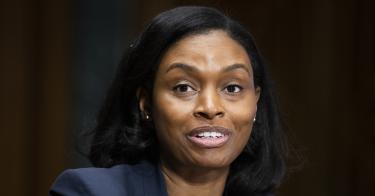President Joe Biden's nominee for a federal judgeship in New York, Natasha Merle, made headlines recently because of her past statements about white supremacy and systemic racism. There is good reason to believe that, despite her claims to the contrary, she will inject controversial and factually inaccurate ideas into her work as a judge. It's been done before.
In earlier speeches, Merle claimed that voter ID laws, President Donald Trump's ban on immigration from countries with high terrorism rates and a proposed border wall are all "grounded in white supremacy."
For many Democrats, this is just the default thing to say about any policy they dislike, but some really believe it. Merle seems to fall into the latter category.
Although there is no factual support for her claim that voter ID laws are white supremacy—and strong evidence disproving it—Merle equated those laws to "poll taxes, literacy tests, dogs and whips."
The nominee is also a devoted believer in the mistaken idea that "the system" is rigged against black people despite the fact that the justice system does not tolerate racism and works hard to root it out.
But Merle's problem is not really with the justice system as it is, guaranteeing equal protection and equal opportunity to all Americans. Her problem is with the very idea of equal protection and equal opportunity. She would apparently prefer equal outcomes across abstract racial groups. Equal chance for individuals is passé.
When asked by Republican senators during her confirmation hearing what role judges have in addressing "systemic racial discrimination," Merle responded that such questions are best left to policy makers, not the judicial branch.
That's the correct answer, but will Merle act like she believes it when she's on the bench? There's reason to believe not. Other judges have injected trendy race wisdom into their opinions even while pretending that they are faithfully applying the law.
Here are two examples.
In 2021, President Biden's administration decided to give priority in limited COVID-19 relief funds to businesses majority-owned by non-whites. A multiracial couple, Mr. and Mrs. Vitolo, were excluded from Biden's priority line because, although she was Hispanic, he was white, and they owned their business 50-50. They sued, arguing that this was unlawful racial discrimination, and won their case. Judge Bernice Donald, however, said they should have lost.
Donald conceded that usually the government may not engage in racial discrimination. But the Supreme Court created a limited exception to that rule in Richmond v. J.A. Croson (1989). In Croson, the Court held that the government may discriminate by race if three conditions are satisfied: (1) the government may not address a "generalized assertion" of historical discrimination, (2) it must target a specific instance of past discrimination and (3) the government must have been at least a "passive participant" in the discrimination.
None of those three conditions was satisfied in the Vitolos' case. The government pointed only to "societal discrimination," offered no evidence of specific instances of discrimination and did not show that it played any role in any discrimination. Judge Donald ignored all of this because, according to the "progressive" wisdom of our day, all disparities between racial groups are caused by discrimination in "the system."
Donald said that "general historical discrimination in the banking industry" was "enough" to allow the government to discriminate against white people and minorities, like Mrs. Vitolo, who married a white person. Judge Donald did not lay out the causal chain from historical discrimination to present-day disparities; she took it on faith.
David Carter, a judge in California, did something similar in a case challenging the dangerous conditions in Los Angeles' homeless encampment in the neighborhood of Skid Row. Although none of the claims in the case involved any racial issues, Judge Carter penned a 110-page diatribe against "a legacy of entrenched structural racism" that "caused" the Skid Row homeless crisis and lingering disparities in black and white housing patterns. To him, this was enough reason to order the government to create various social programs and to put $1 billion in escrow for them.
The key problem with these opinions, and one that any adherent of critical race theory (CRT) is likely to make as a judge, is that they blur the lines of causation. CRT assumes (against all evidence) that all disparities are caused by racism. The law, however, does not allow such sloppy thinking.
>>> Institutionalizing Racial Fanaticism Across American Society
In McCleskey v. Kemp (1987), the Supreme Court rejected the use of a statistical study that purported to show racial disparities in the death penalty because even the most sophisticated studies can only show a risk that race played a role in some decisions. They cannot show that racial animus played a role in a particular decision challenged in a particular lawsuit.
Unsurprisingly, both Judge Donald and Carter ignored McCleskey.
That's the way it often goes with those who fervently believe, against all evidence, that all disparities are caused by racism. They substitute that article of faith for the law's more stringent requirements. They may not even realize that they're doing it. Even though the words are the same, "causation" according to trendy race wisdom is not the same as "causation" in the law—but if you don't think too hard about it, you might not realize the difference.
Whether left-wing lawyers like Judge Donald, Judge Carter and Merle realize the difference or not, the result is the same. They inject the faulty premises of their beliefs about race into judicial opinions while claiming, and perhaps even believing, that they are faithfully applying the law. They aren't.
This piece originally appeared in Newsweek



